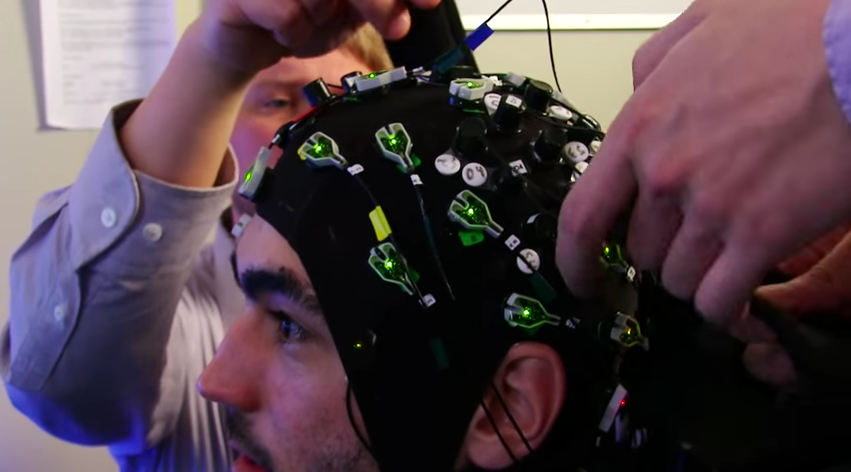Remember that mind-blowing scene in The Matrix when Neo had jiu-jitsu and kung fu uploaded directly into his brain? Researchers from HRL Laboratories are now saying they have developed a similar device that “teaches” pilots new skills. Too bad it’s bullshit.
Sadly, this is a classic case of scientists doing reasonably good work, but then having their results spun (if not outright misrepresented) in the press packaging. The headline of this particular press release reads, “Learn how to fly a plane from expert-pilot brainwave patterns“, undoubtedly inspiring the press to pen such wildly inaccurate headlines as The Telegraph‘s, “Scientists discover how to upload knowledge to your brain“, and RT’s, “Take the red pill: Researchers develop ‘Matrix’-style brain stimulator that instantly teaches skill“. It also doesn’t look good that the researchers have patents pending on their brain stimulation methods, and that the study was published in the controversial pay-to-publish journal, Frontiers in Human Neuroscience.
Above: A video produced by HRL Labs. The researchers write: “It’s a case of life imitating art. Much as the sci-fi film “The Matrix” depicted a device capable of enhancing skill acquisition, researchers at HRL Laboratories, LLC, have discovered that low-current electrical brain stimulation can modulate the learning of complex real-world skills.”
In reality, the new study shows that it may be possible to enhance a person’s existing capacity to learn new skills, but the claim that specific skills or aptitudes can be directly transferred via brain waves is most certainly outside the scope of the findings.
The HRL Labs research team, led by Matthew Phillips, used a neuro-stimulation technique known as transcranial direct current stimulation (tDCS) to excite areas in the brain responsible for learning and skill retention. tDCS is a noninvasive, painless technique that uses a constant, low electric current to stimulate specific brain regions. Several studies suggest it could be used to treat neuropsychological disorders such as depression, anxiety, Parkinson’s disease and chronic pain. Some patients have even demonstrated cognitive improvement, but a recent study found no evidence of cognitive effects from tDCS. The new HRL study now challenges this conclusion.

Image: HRL Labs.
During the experiment, researchers monitored the brain waves of six commercial and military pilots. Afterwards, they transmitted those patterns into 32 novice subjects who were learning to pilot a plane in a flight simulator. Subjects who received tDCS brain stimulation improved their piloting abilities, particularly their landing skills. Those exposed to a placebo showed no such improvement. The finding suggests that tDCS may work to improve, albeit temporarily, a person’s ability to learn. But as noted, it most certainly doesn’t mean that specific types of information were transmitted via the technique.
Mark S. George, a professor of psychiatry, radiology and neurosciences at the Medical University of South Carolina, and editor-in-chief of the science journal Brain Stimulation, wasn’t impressed.
For one, he told Gizmodo, the results hinge on a “small sample study in vulnerable employees, performed by scientists with patents pending that will be influenced by the outcome”. Not to mention that plenty of small studies have shown results using tDCS, but then can’t be replicated.
“This area is quite controversial, with positive studies getting published more frequently than failed trials, creating a publication bias,” he said. “If there is an effect here in this study, the tDCS merely improved the ability of the subjects to learn. There was no transfer of information through the brain stimulation.”
In their study, the scientists state that “the research was conducted in the absence of any commercial or financial relationships that could be construed as a potential conflict of interest”, while also admitting that several of the study’s co-authors “are listed as inventors in patent applications on brain stimulation methods”. It should also be pointed out that HRL labs does R&D for the Boeing Company and General Motors.
As previously noted, the study was published in a rather dubious science journal. Writing in Popular Mechanics, John Wenz explains:
Frontiers of Human Neuroscience is owned by Frontiers Media, which has had a number of retractions, including a highly controversial retracted psychology study regarding the overlap between conspiracy theorists and climate change deniers. The Human Neuroscience journal also retracted a paper recently; in that one, results about inhibition control were actually due to a computing error. Some open access journal advocates have also questioned Frontier’s publishing methods regarding pay-to-publish. There’s also the basic fact that these areas of neuroscience are at the frontier and in their primitive stages.
It’s guilt by association, but the strength of a study can often be gleaned by the quality of the journal it’s published in.
Finally, on the topic of uploading data directly into the brain, it’s highly unlikely that tDCS will ever do the trick. At least not in isolation. Reconfiguring the physical state of neurons to encode for specific engrams, or memories, will require far more than just targeted beams of electric currents. Last month, for example, researchers used a combination of genetics and light delivered by fibre optic cables to alter the memories of mice. The ability to “upload” an entire skill set, whether it be kung fu or piloting an aeroplane, may eventually happen — but it’s not something we’ll see for quite some time.
